Now When You Shop Local, You Can Pay Local Too
In Bed-Stuy, merchants are trying out an innovative, home-grown payment system called Stuypend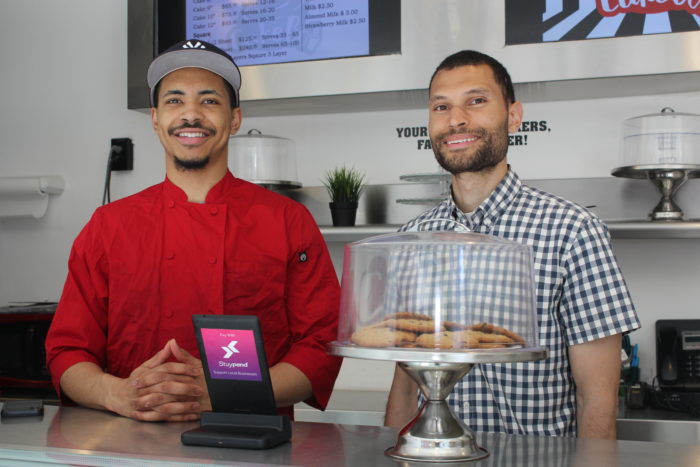
Stuypend co-founder Andre Powers, right, with Cakeboi owner Khayri Ayers, whose shop uses the service (Photos by Arden Phillips)
Few New York City neighborhoods have seen economic growth in recent years like Bedford-Stuyvesant, where small businesses fill previously vacant storefronts. According to a 2017 report by the New York State Comptroller, the number of local businesses grew 73% since 2000, the fourth-fastest economic growth rate among 55 neighborhoods in New York City.
Most businesses, the report also found, are small. Almost three-quarters have fewer than five employees and about 86% have fewer than 10 employees.
This local business landscape was ideal for Bed-Stuy resident Andre Powers to start his own. But instead of opening a brick- and-mortar location, Powers spends his days walking the neighborhood, speaking with the growing ranks of business owners and their customers. That’s because his own business depends on them. He’s the founder of Stuypend, an app-based payment system that’s looking to the neighborhood to get off the ground.
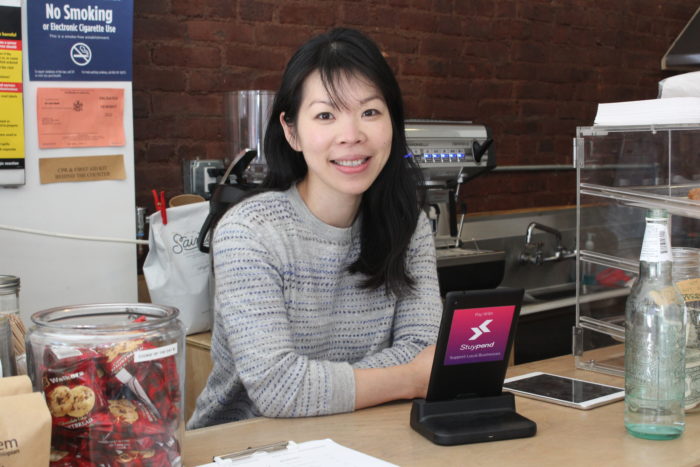
Layla Chen, owner of the cafe Bed-Stuy Provisions, offers a rewards program through the system
Stuypend started because Powers, 32, is not a fan of cash. He dislikes the inconvenience of visiting banks, paying ATM fees, and carrying change. But around Brooklyn, he noticed many small businesses are cash-only, or set credit-card minimums. “I just started asking about it,” he said. The reasoning, he found, was that the fees charged by credit-card companies, which can run from 2% to 3% or more, make it harder for a small company to earn a profit in New York City.
“If a merchant is selling coffee, the margins are tiny,” he said. “If they give up 3% off a cup of coffee, their margin might collapse.”
Getting Stuypend Started
Powers worked at a financial tech startup at the time and knew the e-payments industry was growing. Since Paypal was founded in 1998, e-payment apps, from Apple Pay to Google Wallet to SquareCash, have proliferated in the market.
Stuypend is similar to Venmo, an app where friends pay each other at the touch of a button. But the Stuypend model sets up that exchange between the business owner and customer.
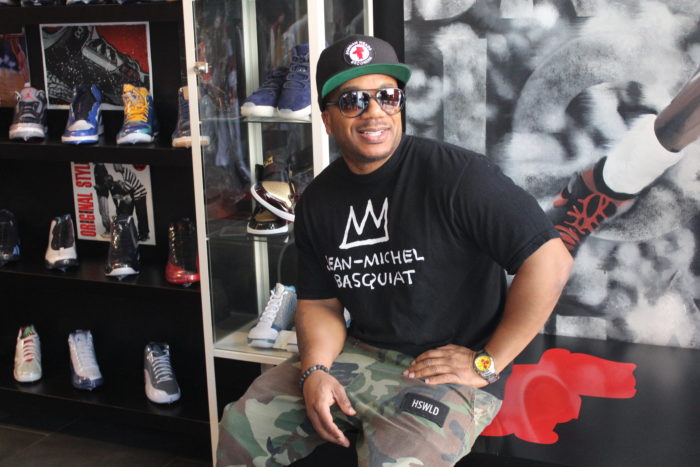
“I thought it was a great idea,” says sneaker-shop owner Fowler. “The way that people pay for things has changed dramatically.”
With fundraising and bootstrapping, Powers worked with computer programmers to develop the technology. (Though Powers has two co-founders who work part-time, Ryan Laszlo and Mike Arul, he is the only one dedicated full-time to the business.) The result was a tablet-based app for small-business operators and a phone-based app for customers, which they can download free of charge from the Stuypend website.
To ring up a sale, the business puts the price into the tablet and a code is generated. The customer scans the code to receive the bill on their own cell phone, where they can authorize payment and add a tip. It’s a basic ACH bank transfer from the customer’s bank account straight to the business.
Most importantly, the business pays a low, flat monthly fee of $50 to use the service, which can work out to be far less than what a small business would pay to a credit-card company.
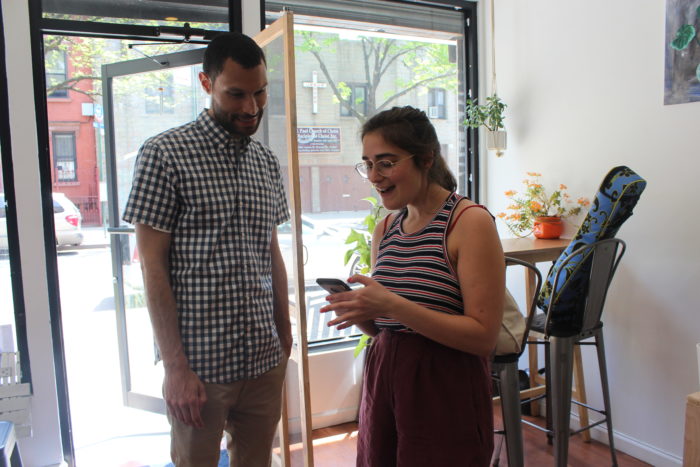
Powers drops in at cooperating merchants to show shoppers how to sign up for the service
From the beginning, Powers says, he “knew Bed-Stuy was the perfect place to launch an app like this.” On top of its economic growth, “it’s a community that’s civic-minded and engaged.”
Powers went door-to-door to local businesses to promote the service, kicking off a pilot program last fall with four: Bar LunÀtico, Sumner Cafe, Jordan Heads Brooklyn, and Fuel Juice Bar. “I thought it was a great idea … the way that people pay for things has changed dramatically,” said Calvan Fowler, founder of Jordan Heads Brooklyn, an Air Jordan sneaker boutique.
With a few businesses on board, Powers faced a greater task: to convince shoppers to download the app and use it. He set up shop at businesses to engage with customers and promote the app. “We got the signals we wanted when we presented it to customers as a convenient way to support a local business they like,” he said.
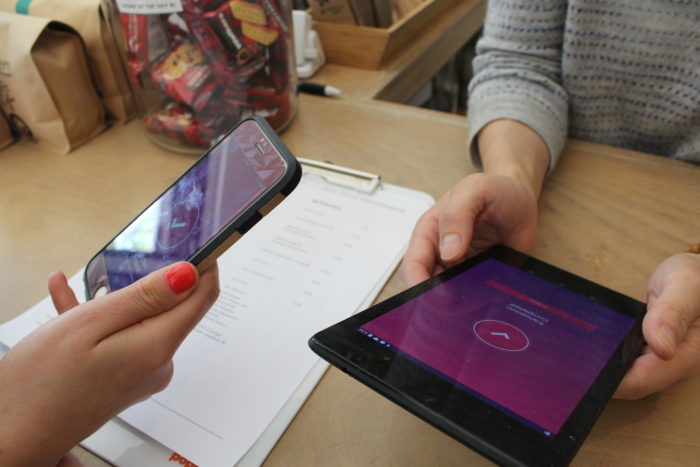
The system is similar to Venmo, but designed for small businesses
As might be expected, Bed-Stuy’s younger residents tend to embrace the concept more readily than their elders. “A lot of people in particular in this area don’t trust cash apps,” said Medina Sadiq, executive director of the Bed-Stuy Gateway BID. “He will have to overcome that, to get more store owners and customers using it.” Fowler, who vetted Powers before deciding to introduce a new payment system into his business, said “he seemed like a very trustworthy person, which he is.”
Growing the Business
In the past several months, Powers translated his in-person visits into a sizeable lineup of participating businesses. “[Andre] shared his passion for what he’s doing, and I signed up on the spot,” said Layla Chen, owner of the cafe Bed-Stuy Provisions.
For her, the appeal of the app is the rewards program, a “virtual punch card” Stuypend recently rolled out for repeat customers. At Bed-Stuy Provisions, Chen said, if customers buy eight sandwiches through Stuypend, they get one free. “It’s a way to give back and build relationships with our customers,” she said.
To read more about small business in Brooklyn, please see our stories about boosting growth and finding affordable locations.
At Jordan Heads Brooklyn, Fowler plans to introduce a rewards program offering a free T-shirt to repeat customers. The Soap Box, a drop-off laundromat service, is unveiling its own perks to promote Stuypend: customers who pay with the app will receive 10% off their total purchase for the month of May, and 5% off thereafter. Clients will also receive 10 lbs. of free laundry service as part of the rewards program.
On a recent weekend afternoon, Powers set up shop outside of Cake Boi, a bakery near the Kingston-Throop Avenues subway station, offering free bites of cake and promoting the rewards program. Khayri Ayers, the business owner, signed up with Stuypend last year.
It’s still too soon to measure Stuypend’s benefits, says Ayers, but he notices that the number of users is growing. A few customers–mostly younger ones–started using the app and find it handy when they want to buy a slice of cake without missing the bus, which stops outside. He added that he gained a new customer after a Stuypend user heard about Cake Boi through the app.
Powers said it is still “very early for us” as he continues to partner with local businesses and fine tune the app. But his goal–despite the app’s hyper-local name–is to expand.
“The credit-card processing industry has too much power and charges too much money,” he said. “I think we could basically help any small business, wherever they are.”
The plan is to unroll the service in adjacent neighborhoods and across the city, he said. But as for the Stuypend moniker, “I don’t think a name change is needed,” Powers said. “Bed-Stuy has a lot of cachet. And people like something with a story–a product started in a specific place, for a specific reason.”
He took a moment to consider the app’s appeal beyond neighborhood businesses. “If it does become something really big that people know,” he said, “I want them to know it was started in Bed-Stuy, that this is a Bed-Stuy product.”













